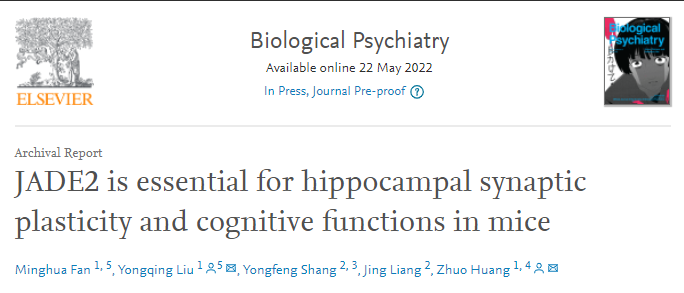Dr. Zhuo Huang: JADE2 is essential for hippocampal synaptic plasticity and cognitive functions in mice

Abstract
Background
Impairment of synaptic plasticity is closely correlated with a range of pathological conditions, such as cognitive deficits. However, how synaptic efficacy is regulated remains incompletely understood. Here, we reported the epigenetic factor Jade family PHD finger 2 (JADE2) was indispensable for the maintenance of hippocampal synaptic plasticity and cognitive functions in mice.
Methods
We used Morris water maze and fear conditioning test to examine learning related behaviors. In addition, Western blot, viral-mediated JADE2 manipulations, RNA sequencing and electrophysiological recordings were employed to address our questions.
Results
JADE2 expression is increased upon enhanced neuronal activity in vitro and in vivo. Knockdown or genetic deletion of Jade2 in hippocampal CA1 results in impaired structural and functional synaptic plasticity, leading to memory impairment, whereas overexpression of JADE2 in CA1 neurons facilitates hippocampal-dependent learning and memory. Mechanistically, our data show that JADE2 modulates synaptic functions mainly by transcriptional activation of cytoskeletal regulator Rac family small GTPase 1 (Rac1), and this activity is dependent on its interaction with histone acetyltransferase HBO1. Finally, we demonstrate that restoring RAC1 expression in the Jade2 knockout mice could rescue the deficits in synaptic plasticity and learning related behaviors.
Conclusions
Our findings reveal that JADE2 plays a critical role in regulating synaptic plasticity and memory formation, suggesting activity-dependent epigenetic regulation is an important molecular mechanism in controlling synaptic plasticity.
Original link: https://doi.org/10.1016/j.biopsych.2022.05.021